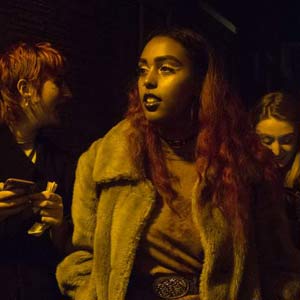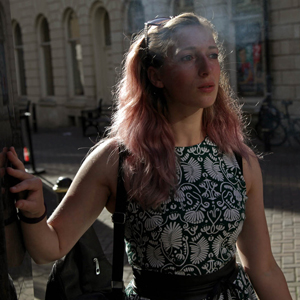Studying history, politics and economics at A-level and hopes to work for the civil service after university
The big thing for me is tuition fees with the looming issue of being £40,000 in debt. If I could vote this would have an impact, but I don’t think it would sway me. While you can dream about not having tuition fees you have to be realistic, things need to be paid for and there isn’t unlimited money.
By the time I can vote people who are currently in year nine, five years below me – who look really young – will be able to vote as well.
I hope by then there will be a feasible middle ground party. Both parties are adversarial, there is no middle ground compromise - you are either branded a Tory or socialist. The Liberals are not a feasible opposition. They need stronger leadership. A clearer, rational manifesto.
They could only lower the voting age to 16 if politics was introduced as a compulsory subject in education. There were people at my college asking what a general election was when the snap election was called. When people like that can vote but we can’t, it is kinda frustrating.
Even a lot of the older generation don’t have time to find out info and are not bothered. I think social media is the only form of politics that a lot of people get involved in. Videos on Facebook or scrolling through Twitter – a lot of politicians use it nowadays, it is a good way for people to interact, but you also get the other side. You don’t know what to trust.
Studying computer science, economics, geography and maths at A-level and hopes to study abroad
I hope to take a gap year after A-levels and then study in America. But I think we live in quite uncertain times now, especially with Donald Trump being in office and Brexit. I am unsure about how my plans will fit into how the world is going right now.
It creates a conflict between my academic ambitions and what's smart to do, especially because Trump recently pulled out of the Paris Agreement and has turned his back on the issue of climate change. For someone who comes from the UK, who is studying geography and who knows that these are real problems facing the world, it is a personal conflict to go to a country that is basically saying that these problems don't matter.
One positive thing is that there are a lot more opportunities available for people who come from less wealthy backgrounds.
There are a lot of programmes out there for people to go and explore other options for their career. I attended an international summer school in America for a week which allowed me to visit different schools.
I think that the best thing about being young now is that there are a lot of programmes to help take away the barriers that hold back some people who don't have much money.
It may be a bit unrealistic to say that it will change, but I wish there was more transparency in what politicians say and a bit more certainty about what they actually hope to do.
I know that in the Brexit campaigns there was a lot of confusion. It was said that £350m was taken away from the NHS. After studying economics, I was thinking that doesn't really make sense, it doesn't come together.
I think it is sad in a sense that some people would see that and because they're not informed enough to make choices, they would actually believe it and then form opinions based on that.
Studying history, philosophy and sociology at A-level, and hopes to study politics at university
I go to a girls' school and I’m interested in women’s issues. We’ve got an equal pay gap which could affect me throughout my career, as it’ll take a long time to even that out.
Even though I can’t vote, I tell friends to register to vote. You can’t now say, “Oh, I’m not going to vote as I don’t know anything about politics,” because you can easily just go on a Facebook page and read, and if you don’t want to read there are videos.
I think politics should be taught at school so teenagers get a broader perspective and voting should be compulsory like in Australia.
I have a very political social media as lots of my friends are political.
If I was judging by my Facebook, Jeremy Corbyn would win the election, but that probably won’t happen. So you have a very narrow minded view, it’s not very representational. You sit with your friends who all have the same political views, you’ve got friends on Facebook all with the same political views.
Studying apprenticeship in engineering as a four year course for Level 3 NVQ
Housing prices is my big issue. Within five years I’ll be thinking about moving out, but it’s scary as the numbers are big. I’d like more affordable housing for young people, not necessarily renting, but to get on the housing ladder with a mortgage that’s not horrendous.
As an 18-year-old there’s loads of opportunities - education, apprenticeships, uni or going straight into work. But there’s still quite a lot of stress and you can get caught up in it – but you can’t have it all good and no bad.
I’d like to get a degree in engineering, I’m not sure what speciality yet, but that would be my goal. Instead of going to uni I’d like to go the alternate route and continue working. It would be sponsored with no fees on my part. I want to be in the working world, earning money and getting experience.
One good mate is also doing an engineering apprenticeship and another is doing engineering at uni. It will be interesting to see where we all end up.
Studying economics and has won a place at Oxford University
I became a vegetarian after doing a project on food consumption and agriculture. Animal agriculture is causing poverty traps in the developing world because of the grains fed to animals, so meat consumption is a big problem. Something like 50% of grain is used to feed animals instead of humans.
If you focus on the little things, it does make a big difference in the grand scheme of things. I think a lot of people are aware of issues but think if I change it’s not going to make a difference, but if everyone has that attitude nothing is going to change.
One thing that’s really good about being a teenager nowadays is the interconnectedness of social media. Some people think social media is a barricade to social interaction in person but you get a broader overview. Even with the general election, pretty much everything I learn about politics and economics and things outside of work at school is what I learn from Twitter.
There has to be a point where you limit your use of it, as you can get quite absorbed in it.
Going to university, one thing that I’ve been looking at is the abolishing tuition fees, as it’s something I’ve been worried about. A lot of people choose not to go because of money and I think that shouldn’t be a barrier to education.
I think, especially with terrorism threats, there’s a lot of hatred towards the idea of immigration and people really associate those things with migration. It’s an unfair thing to do. Migration is a good thing, there are skills shortages and a connected world is always a better world.
Megan plans to study contemporary dance and Holly wants to study English and creative writing
Holly
Right now funding for university is an issue. Being siblings, our mum has to try to cover the cost for both of us to go to uni at the same time. I just think it’s not fair on parents.
Megan
I say the same. In a way I feel like they shouldn’t base it on household income, they should base it on how good that person is or what they want to study. So if they are getting really high grades, they should get more funding. I’m going to study contemporary dance.
Holly
With people that are training to be an army medic or a doctor, they get paid by that profession to go to university. My grandma always says to me, “If you want to go into teaching, why is teaching not something you can study at university for free?” and I do wonder why, because if you are going to do a job that’s benefiting thousands of people, why should that not be paid for by that profession?
I’m going to study English and creative writing, with the intention of going on to teaching or something in the writing field. In my spare time, I also work in a care home.
Megan
I feel like we have a lot more freedom to have an opinion on things and to go where we want. At this age you become more interested in what’s going on the world, like politics and you start to get a lot more of your own opinions.
Holly
I think the uses of the internet have changed. I think originally it was formed to interact with people you knew and for people to advertise businesses. There are a lot of negatives such as cyberbullying and now everyone looks at the internet as though it’s this negative thing, but it wasn't originally created for that and I think people forget that.
Megan
Our uncle lives in Australia and it’s an amazing thing for us to have the internet because we are able to stay in contact. People who are always on their phone tend not to go out as much as they can see things on the phone. I think although it was created to connect people, it’s made people disconnect in a way, because they don’t talk to each other as much.
Holly
A lot of people find out things about people or world issues online and I think people struggle to differentiate between true news and fake news. A lot of us can forget sometimes what the difference is. It’s important sometimes to sit down and actually watch the news on TV to understand the true story than just read an article that has been written using little knowledge and no facts.
Taking a gap year before university and hopes to work for an NGO in the future
The good thing about being my age is the sheer amount of opportunities you have - you can choose whatever you want. My plans change from one month to the next. They are all based around social work, working for an NGO or something. I’m taking a gap year before going to university to work for an NGO in South America and NGOs in the UK.
The older generation has tended to say that under-25s are the least politically engaged. Now you see social media campaigns involving young people. A leaflet through the door or a long speech by a politician perhaps wouldn’t engage young people the same as a snappy 10-second internet clip. That’s a very positive thing about social media, it’s great for sharing ideas and maintaining friendships.
Young people can’t necessarily relate to politicians who almost appear to be playing the game. By the time I get to vote it would be nice to have a more honest, open political landscape.
After Brexit we saw a spike in hate crime. It is upsetting to see some political parties exploiting it. Seeing responses from some politicians and celebrities to the refugee crisis, I think as a society we’ve become detached from human suffering. I’d like to see some kind of reawakening of that connection with other people.
Studying law, economics, history and wants to read law and management
When I was 16, although I had an interest I wasn’t informed enough to make a decision, so I think 18 to vote is fair enough.
I feel like young people have a lot more freedom and are treated a lot more like adults now than in the past. But in terms of making a success out of your life, I feel like that’s quite difficult. Especially as you’ve got to pay to go to university now and things like house prices are so expensive. I feel like when we are older, 25 or 26, things will be a lot harder for us than it was for other people.
People use social media to express their opinions but it stops them from actually going out and doing something about it. I think that before if people didn’t agree with something people would protest or start petitions. Now when people don’t agree they just complain on Facebook.
You see a lot more arguments on social media than in real life and they are usually arguments that don’t need to be fought.
I’m training to be a professional wrestler. I compete every now and again and train every week.
Studying psychology, sociology and English literature and going to do international relations at university
Since Brexit there has been more of an interest in politics from young people. All over Facebook and social media my friends are looking at stuff and sharing and trying to find out what party is suitable. I’ve never been in a situation where this many people are interested.
There’s lots of issues I feel strongly about – like the education system and university fees. I think mental health should have its own sector because they say young people really struggle with help.
Recognition for the LGBT community, Black Lives Matter, social movements that would never have mattered previously now do. I think we are becoming more aware of other people and less specific about things like gender and identity. Self-expression has become very important and that reflects on people’s politics as well because the way people see their identity is often linked to that.
I think if it’s used properly social media can be good, like over in Manchester people posting on Twitter, “I have a spare room, you can come and stay” - that humanity has been seen before, but it’s such an instant connection online and it can bring people together – but it can also pull them apart and I think it just depends on the way you use it.






























